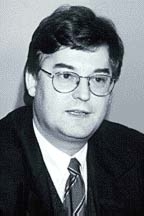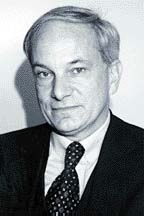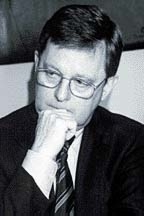|
Winter 1996 (4.4) 
Above, left to right: Michael Schmunk - Azerbaijan The following conversation took place in Baku with Bonn's Klaus Neubert and Ambassadors Carola Müller-Holtkemper, Norbert Baas and Michael Schmunk. The main topic of discussion was how the German government views the three states of the Caucasus. Neubert: Very early on after the collapse of the Soviet Union in 1991, we began to treat the three states of the Caucasus (Armenia, Azerbaijan and Georgia) along with the Central Asian states (Turkmenistan, Kazakhstan, Uzbekistan and Kyrghyzstan) as one interrelated region, and not as individual, isolated nation-states. Our goal is to foster close cooperation between our three embassies in the Caucasus and the State Ministry in Bonn. The countries of this region share common concerns and problems. They are all undergoing political and economic changes that resulted from the collapse of a centralized government. In addition, there are political conflicts in the Caucasus which still must be resolved. We want to be involved with this process of transformation, both in the political and economic arenas, because we think that the region needs political stability. Basically, all three states of the Caucasus are rich in human resources, which I feel is even more valuable than natural resources. Of course, Azerbaijan is extremely privileged in terms of oil and gas reserves, but the other countries have resources that can be developed, as well. That's why we view this region, not in geographic isolation, but in relation to each other and to its neighbors to the East-the states of Central Asia. They, too, share the similar task of developing economic resources and establishing solid links to the world market. What all these countries need is assistance and cooperation from the international community. It's not really a question of giving them aid, but of simply helping them "open doors" and "cross bridges" so that they can discover their own role as economic players in the international community. Müller-Holtkemper: Even though I'm fairly new to my position as Ambassador to Armenia (since July 19), I've tried to familiarize myself with the region as quickly as possible. I've traveled through Georgia and now am visiting Azerbaijan. I personally believe that it's very important when you work in this area not to restrict your view to only one country, but to try to understand the complexity of the entire region. Baas: As Ambassador to Georgia, I think that the development of a strong economy in the region is critical to us all. In the long run, I think these three countries will be able to develop strong relations and cooperation. But it's something we all need to work towards. The recent visit by Azerbaijan's President Heydar Aliyev to Georgia certainly marked a new stage in relations between our two countries. Aliyev made a remarkable speech in the Georgian Parliament, and it seems to me that both President Shevardnadze and President Aliyev, as well as the peoples of Georgia and Azerbaijan, have really made a bold step forward towards partnership and friendship. At least, this is what we feel in Georgia these days. Schmunk: I have traveled in this region both to Central Asia and most recently to Georgia and Armenia. Although there are some differences in religion and culture, the most obvious impression you get when traveling through the Caucasus is that these states have much in common. And I have experienced wonderful hospitality in all three. I've also traveled with an Azerbaijani license-plate to Armenia and met with no hostility at all. I'm very sure that there will come a time when Armenians and Azeris will be able to live next door to each other once again. Baas: We understand the concern of these countries to remain independent. We support this. Conflicts impede the economic growth in this region. We all are looking forward to the conflicts being resolved, and the countries in the region becoming stronger partners to the European Union (EU). Soon there will be a transportation system linking Europe and the Caucasus with Central Asia. This link is not only symbolic but very pragmatic as well. Neubert: Domestic political stability is critical. None of these countries can afford destabilization from the inside. The economy must give the population a chance not only to earn a living but also to have an economic, social and professional perspective. The potential is there, both in natural resources and in human resources. It's also very important to resolve the remaining political questions in dispute. Fortunately, the cease-fires in each of these regions (Nagorno-Karabakh and Abkhazia, Georgia) seem to be lasting. But that is not enough. We must move on to a durable political solution which will be accepted by all. The German government has been very active in the Minsk Group (OSCE-Organization of Security and Cooperation in Europe) which has been working very hard on the Azerbaijani-Armenian conflict. As far as the German position within the Minsk Group is concerned, the territorial integrity of Azerbaijan is beyond discussion. Nagorno-Karabakh must be viewed as territory within Azerbaijan. However, the question that still remains is how to deal with the Armenian population living in Nagorno-Karabakh to ensure their security and to provide a status which gives them an adequate measure of self-government. At the beginning, this may require an international presence to supervise whatever detailed arrangements the two governments in Baku and in Yerevan will eventually negotiate. We're ready to assist in that. Broad principles have now been established for a peaceful resolution. Obviously, there is still work to be done. That's the "fine print." The question is how will the details be worked out? What shape will they take in order to make it possible for Azerbaijanis and Armenians to live together again economically, professionally and socially? This conflict cannot be resolved militarily. Müller-Holtkemper: Obviously, the parties in conflict must negotiate between themselves and reach conclusions which are solid, durable and acceptable to everyone concerned. We will certainly continue to work with them and support their efforts. But clearly, as foreigners, we are not in a position to solve these problems. Yet, we hope a solution can be found as soon as possible. Economic pressures are building. It is in the interest of all players to come to terms. Throughout this process it is critically important to maintain a dialogue as it becomes very dangerous when radical voices on either side start talking about possible military solutions, or military pressure. I think such discussion would damage the overall prospects for a peaceful and political settlement. Schmunk: Each country has a considerable number of displaced people and refugees which burden their respective governments. Germany has been trying to ameliorate this problem by providing financial resources and technical help to assist the refugees and the displaced people. Perhaps we're particularly sensitive to this tragedy because, after World War II, we faced similar dilemmas with our own refugee populations. Baas: By the time this interview is published, the Lisbon Summit (December 2-3) will have taken place. Whatever the outcome, we should not expect a solution overnight. We're talking about long negotiation processes. However, all three countries of the Caucasus are members of the OSCE family, which is a family of values and principles. I'm quite sure that this family spirit will prevail one day, and that the principles will be kept. There is never a perfect solution
for such painful complexities. All of us, and especially the
countries that are involved in these conflicts, have to be aware
that, within this family of values, compromises must be found.
Otherwise, these conflicts will drag on indefinitely. AI Home | Magazine Choice | Topics | Store | Contact us |




